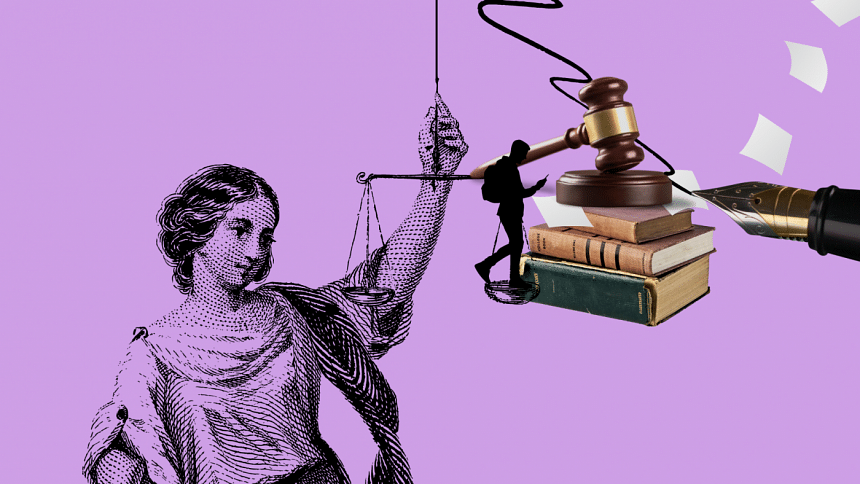How to take legal action if you're a victim of harassment

Harassment can be described as actions that bother, threaten, intimidate, frighten, or make individuals worry for their safety. They are motivated by discriminatory intentions and have the effect of preventing or limiting a person from exercising their rights. Aside from physical assault, things like obstruction of normal movement or work, offensive touching, and offensive posters or cartoons that are objectionable to the eye are all included in this category. Harassment is unwanted, unsolicited behaviour that humiliates, offends, or threatens the victim and fosters a hostile atmosphere.
Being the victim of harassment can make one feel violated, terrified, and helpless. While taking legal action will not undo the harrowing experience, it can help to regain some control of the situation and attain a sense of justice.
In Bangladesh, children under the age of 18 can seek legal action with the assistance of a guardian, who will file the complaint on the children's behalf. Pursuing legal recourse as a young individual in Bangladesh who has experienced harassment can be a daunting and challenging process due to various factors. The societal stigma surrounding such situations further complicates matters. The fear of prejudice and judgement from society as a whole often deter victims from coming forward and reporting the crime.
However, it is not impossible, as Refat Bin Reza Rafi, Barrister-at-Law, explains the methods through which a victim might file a case against their harasser.
The initial step might be as simple as calling 999 in an emergency or contacting the police station to report the harassment. Before filing the First Information Report (FIR) based on the available information, police will need an ejahar (application) from the victim or they will prepare their own based on their initial investigation. Ejahar serves as an accurate depiction of an event that has taken place, as it is documented promptly following a crime. The FIR initiates a General Register (GR) case, which allows the police station to take direct action if the crime is cognisable and falls under the station's jurisdiction. Following that, the police will open an investigation, make a chargesheet, which is a police station record documenting the charges filed against an individual, and forward it to court.
In the event of physical injury, it is advisable to prioritise seeking immediate medical attention and maintaining a record of the doctor's examination and treatments. This documentation can serve as valuable evidence to support your case in the future.
It is not strictly necessary to engage an advocate in a GR/FIR case since the Public Prosecutor (PP) will handle it on behalf of the state. However, if the situation permits, one may also decide to retain an advocate to support and strengthen their case.
The police may refuse to consider the issue in some cases. In that situation, submitting a General Diary (GD) is a recommended course of action. This helps create an official record of the incident and ensures that the necessary information is documented with the police authorities.
A GD will assist in making up for the time lost in filing a case if you are unable to use the general register path. While filing a case through other means, it is worth noting that submitting a GD can still provide valuable support to the case.
It is highly recommended to consult a lawyer when filing a GD, as their expertise can strengthen the document's evidentiary value in a criminal court. Their guidance ensures that the GD is prepared effectively to bolster the case.
If you are unable to file a GR case, you may file a Complaint Register (CR)/Non-FIR case directly as a complainant in the criminal court. With the help of an advocate, victims can use this path and directly file a case in court.
The seriousness of harassment allegations varies, and when deciding whether to file charges, courts take into account things including the defendant's prior criminal history and violations of restraining orders.
The formal legal system sometimes may be expensive, requiring victims to go through several formalities and spend a significant amount of money on hiring an advocate to handle their case, court costs, and other requite expenses.
Access to justice has remained a distant dream for our nation's young people. They are usually unable to receive justice from a court of law due to a variety of socioeconomic limitations. If their rights are violated, they have no recourse.
Many young people who are victims come from underprivileged families and do not have the financial means to file a case. This may restrict their ability to obtain legal counsel and the tools they need to deal with the legal system. The Legal Aid Services Act of 2000 was established by the government in order to provide easy access to justice and protect the rights of underprivileged litigants. This act offers disadvantaged members of society free legal assistance, allowing government and non-government organisations at all levels to provide the most efficient and effective services to disadvantaged justice seekers.
Bangladesh Rural Advancement Committee (BRAC), Madaripur Legal Aid Organisation, Bangladesh Legal Aid and Service Trust (BLAST), Ain-O-Salish Kendra (ASK), Democracy Watch Bangladesh, Human Rights and Peace for Bangladesh (HRPB), and various other local and national nongovernmental organisations provide various types of legal aid services. These services include legal aid in the form of cost and advice to conduct a suit in court, problem resolution through alternative dispute resolution (ADR), local salish, mediation, and so on, as well as community awareness campaigns to raise legal awareness.
The fear of retaliation is a major worry for those who have been in compromising circumstances. In order to stop victims from reporting the crime and seeking justice, perpetrators and their relatives may resort to violence and intimidation. To overcome these obstacles, awareness of legal rights need to be raised and victims need to be given access to resources and support networks.
Holding the individual or people accountable for their conduct sends a message that such behaviour is unacceptable and will not be tolerated. This might provide closure and help victims to begin the healing process. Knowing there would be repercussions for their conduct may deter them from repeating similar acts. This can assist in making our societies safer and lower the chance of future criminal activity.
References:
1. Bangladesh National Portal. (15 September, 2018). Legal Aid Empowers the Critically Disadvantaged People of Bangladesh.
2. Legislative and Parliamentary Affairs Division Ministry of Law. Penal Code 1860, The Code of Criminal Procedure, 1898
3. LawyersClubBangladesh.com (13 July, 2019). Beginners guide to file a civil suit in Bangladesh
Sumaiya is just trying to make it through each day; give her toxic positivism at [email protected]

 For all latest news, follow The Daily Star's Google News channel.
For all latest news, follow The Daily Star's Google News channel. 








Comments